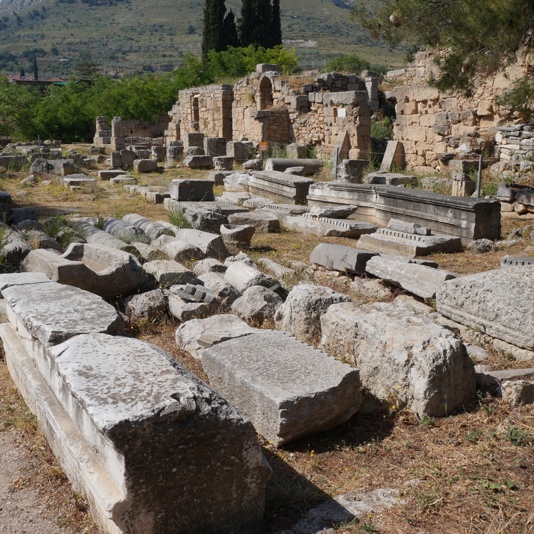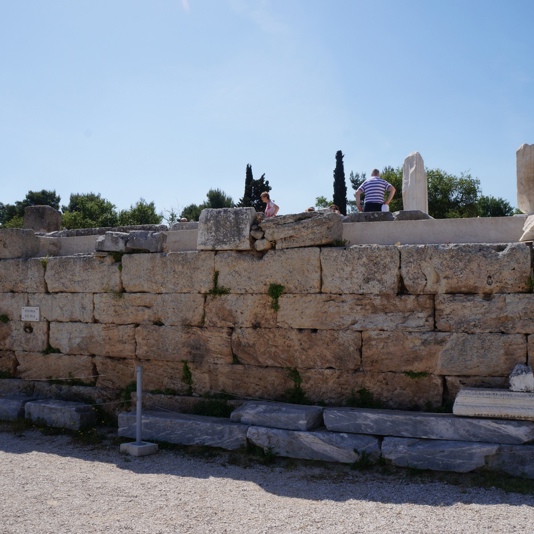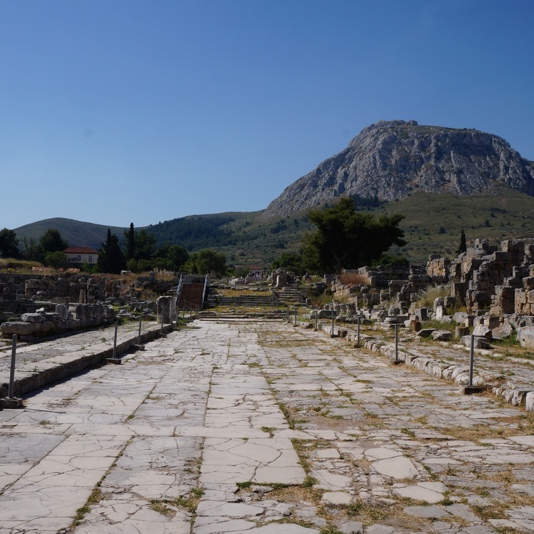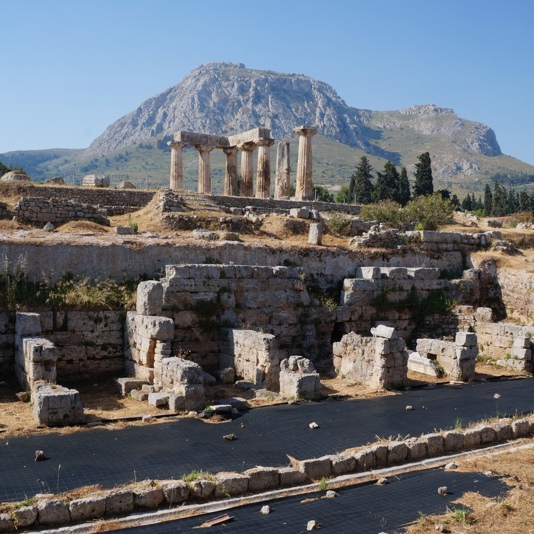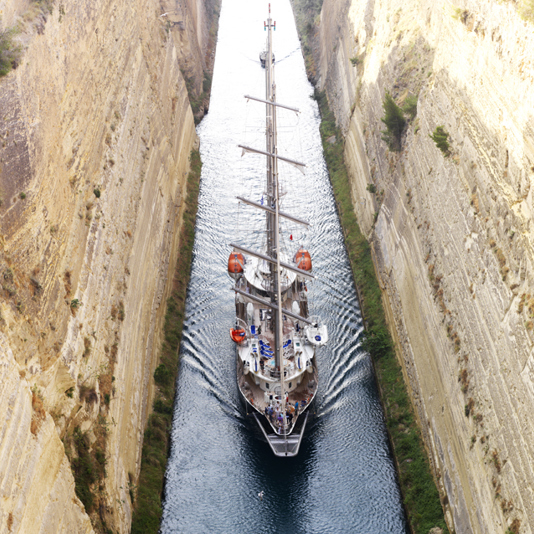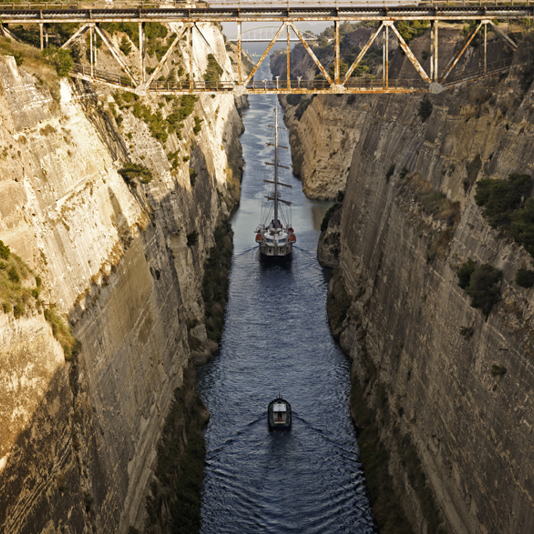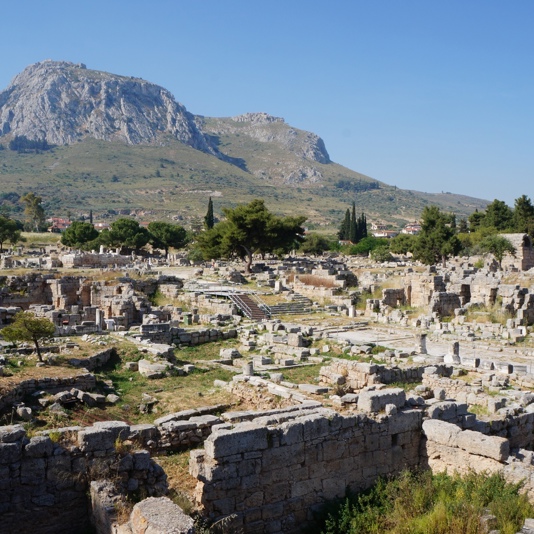Touch a legend, witness Corinth canal, a man-made miracle, and Ancient Corinth – whilom immensely wealthy and powerful city, a highly desirable conquest.
Welcome to the beautiful port of Corinth, a bustling gateway to one of the most historical regions of Greece. Located on the northern coast of the Peloponnese peninsula, this port is a must-visit destination for any traveler interested in ancient history and mythology.
As you disembark from your cruise, you will be greeted by the stunning view of the Gulf of Corinth, with the towering mountains of the Peloponnese in the distance. The port is conveniently located near the city of Corinth, which boasts a rich history dating back to ancient Greece.
One of the main attractions near the port is the ancient city of Corinth, which was one of the most important cities in ancient Greece. Explore the ancient ruins of the Temple of Apollo, the Acrocorinth, and the impressive Roman Odeon. Don't miss out on the chance to walk on the same streets as the ancient Greeks and Romans did thousands of years ago.
After visiting the ancient city, take a short drive to the nearby town of Loutraki, known for its hot springs and natural spas. Relax in the healing waters while taking in the beautiful views of the surrounding landscape.
Another must-visit attraction near the port is the famous Corinth Canal, which connects the Gulf of Corinth with the Saronic Gulf. Take a boat tour of the canal and marvel at the impressive engineering feat that was accomplished over a century ago.
If you're interested in traditional Greek villages, head to the charming village of Ancient Corinth. Here, you'll find picturesque streets lined with whitewashed buildings, traditional taverns, and local shops selling handmade souvenirs.
Make sure to indulge in the delicious local cuisine, with fresh seafood being a particular highlight. Try the famous Greek dish of grilled octopus or indulge in some freshly caught fish.
With its rich history, stunning scenery, and delicious food, Corinth is a port you won't want to miss on your Greek cruise adventure.
Corinth’s first named was Ephyra because the Oceanid Ephyra was the first to dwell in Corinth.
The Hecatoncheire Briareus arbitrated between Helius and Poseidon, who had a dispute concerning the lands about Corinth. Briareus assigned to Poseidon the Isthmus of Corinth, and gave to Helius Acrocorinthus. Helius gave Corinth to his son Aeetes.
The city was renamed after Corinthus - one of its kings and possibly descendant of Zeus.
Corinthus might be the father of Sylea. She married the bandit Procrustes who was fitting the passers-by to the bed. Procrustes was killed by Theseus.
But others say that Corinthus died childless, so the Corinthians sent for Medea, daughter of Aeetes (son of Helius).
Anyway here Jason, the husband of Medea and the leader of Argonauts, left Medea for Glauke. Spiteful Medea presented Glauke with a wedding dress that burst into flames. Trying to save herself Glauke threw herself to the fountain. This fountain was later named after her.
Sisyphus was a notorious king of Corinth. He violated the Xenia, the concept of hospitality to travellers by killing them. When Zeus abducted Aegina, the daughter of the river god Asopus, Sisyphus told Asopus where Aegina was and thus angered Zeus. Zeus sent death after Sisyphus, but he cheated it thrice! For all that Sisyphus was forced to eternally roll an immense boulder up a hill.
The Corinthian harbors of Lechaeum and Cenchrae are called after Leches and Cenchrias, sons of Poseidon and Pirene, daughter of the chief of the river gods Achelous.
There 2 versions of creating a sacred Pirene spring: either Asopus created a spring to flow in Corinth in return to Sisyphus telling him where his daughter was, or Pirene became a spring because she could not stop crying when her son Cenchrias was unintentionally killed by Artemis. The spring became a favorite watering-hole of Pegasus.
During the Trojan War the Corinthians participated under the leadership of Agamemnon.
Nearby Corinth lies Stymphalia lake where Hercules confronted and defeated the Stymphalian birds with his arrow.

